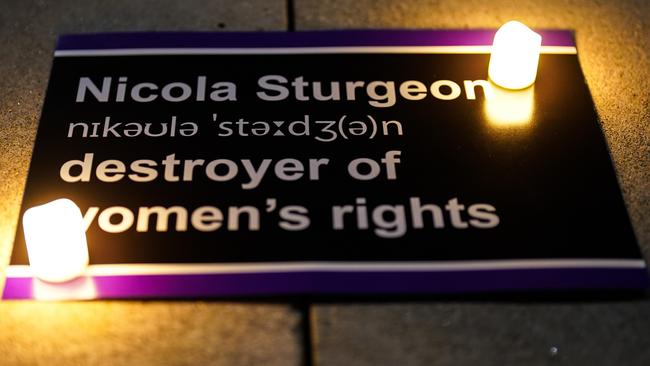Scotland passes contentious trans gender recognition bill
Opponents fear the legislation, which permits people as young as 16 to change sex without medical diagnosis, will be exploited by violent males.

One of the most divisive and contentious legislative bills has been passed in Scotland, allowing people as young as 16 to change sex without any medical diagnosis.
Amid loud protests from feminists in the public gallery, the Gender Recognition Reform (Scotland) Bill passed by 86 votes to 39 on Thursday after Scotland First Minister Nicola Sturgeon whipped the Scottish Nationalist MPs to vote in favour allowing transgender males and females to change their legal sex by simply signing a statutory declaration. It was also supported by the Scottish Greens, Labour and Liberal Democrats.
While the bill passed easily in Holyrood, the public debate has been particularly toxic, with polls showing two thirds of voters oppose the bill.
Feminist and author JK Rowling said before the vote that the bill was “the single biggest assault on the rights of Scottish women and girls in my lifetime” equating it as Ms Sturgeon’s poll tax.
Transgender people from the age of 16 will now only have to live in their acquired gender for six months in order to obtain a legal gender recognition certificate, raising fears by feminists that the new law will create significant safety issues for women and children. Those 18 and over only need to live in their acquired gender for three months.
Scottish parliamentarians stood and clapped towards the gallery where a group of transgender activists were celebrating the vote. However other members of the public screamed out “shame on you” and “this is the darkest day”.

Earlier, protests were held throughout Scottish cities, including Edinburgh, where women in the suffragette colours of green and purple paraded signs such as “Women are angry, ignore us at your peril’’.
Most controversially the new bill will allow accused rapists and pedophiles the ability to legally change sex, raising fears that predatory men will be tried in court as a transgender woman and be placed in female prisons and facilities.
Rachael Hamilton, the equalities spokeswoman for the Scottish Tories, said the Scottish public didn’t back the new bill, and that it would make it easier “for criminal men to attack women”.
She said: “The bill makes it vastly easier to obtain a Gender Recognition Certificate, but it doesn’t just do that for trans people. It does that for violent males too.
“It will let criminals exploit a system which puts women at risk in all kinds of ways. While most of us across Scotland are good, decent, reasonable people, rapists are not. Sex offenders are not.
“It is ignorant in the extreme to believe they will not take advantage of loopholes that are ripe for exploitation.”
She added: “We have been shown countless times by those giving evidence that predatory sex offenders will exploit Nicola Sturgeon’s gender self-ID experiment.”
The UK Government said it will consider blocking the bill because of these safety issues. There are also concerns in Westminster that aspects of the bill will have an adverse effect on areas of the law considered “reserved”, such as the equities bill, which are determined by Westminster, not Holyrood.
In a statement the Secretary of State for Scotland, Alister Jack said: “We share the concerns that many people have regarding certain aspects of this bill, and in particular the safety issues for women and children.
“We will look closely at that, and also the ramifications for the 2010 Equality Act and other UK wide legislation, in the coming weeks – up to and including a Section 35 order stopping the bill going for Royal Assent if necessary.”
Scotland’s social justice minister, Shona Robison, proposed the transgender bill and likened it to equal marriage and civil partnership legislation. “This is an important step to creating a more equal Scotland”, she insisted.
“Trans rights are not in competition with women’s rights, and as so often before, we can improve things for everyone when those discriminated against act as allies, not opponents’’.




To join the conversation, please log in. Don't have an account? Register
Join the conversation, you are commenting as Logout